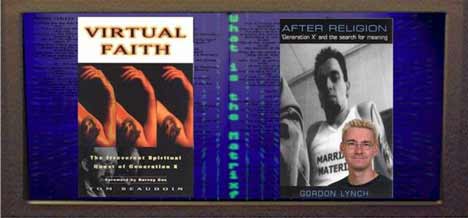Tom Beaudoin, an American Catholic writer, published “Virtual Faith” in 1998, a book linked with his doctoral work at Boston College. He’s just started as a lecturer in Christian tradition and practical theology at Santa Clara University, California.

Gordon Lynch, in his book, “After Religion”, summarises a fair chunk of “Virtual Faith” by writing:
‘Xers’, like all human beings, have a need to search and express fundamental ideas and beliefs about the meaning of life. Popular culture has a special significance in the lives of members of ‘Generation X’. For ‘Xers’, the search for, and expression of, meaning thus primarily takes place through the medium of popular culture.
Beaudoin argues that popular culture is made up of ‘texts’ that express particular views about the meaning of life. These texts could be any popular culture ‘event’. Tom examines three kinds of popular culture as text: music video, cyberspace, and body adornment.
Gordon Lynch has a few problems with the idea that certain shared values are embedded in texts for a whole generation. I share the same concerns. As I read ‘Virtual Faith’ back in 1998 I had to admit I’d never seen half the music videos unpacked by Beaudoin. Since then I’ve made an effort to engage with some of that material. I’ve used R.E.M.’s clips, “Losing My Religion” and “Everybody Hurts” in a few settings.
Gordon explores the limitations of any popular ‘text’ by examining the huge range of interpretations around the movie ‘The Matrix’. Fair point. Lynch is saying therefore that popular culture has not become the scripture for ‘generation x’ – because there is not a definitive interpretation of the medium. Hang on a minute there Gordon… I think you’re talking about ‘scripture’ in a fairly narrow sense, in fact in a fairly conservative evangelical sense. If we look at any part of the Christian scriptures, we can find a huge range of interpretations from literalist through to post-Christian and even at times Satanist viewpoints. That doesn’t take away the fact that the writings of the ‘Old and New Testaments’ are regarded as reference points for people engaging with Christian faith.
In the same way, there is a wide collection of popular cultural texts that gives us clues about a wide range of sub cultures within any generational cohort. To claim that R.E.M. is the anthemic expression of ‘generation x’, as one or two authors have done, is like saying that Douglas Coupland is the spokesman for the same group. Within one city we’ll find a range of musical styles, life style issues, attitudes to modernism and postmodernism, approaches to clothing and use of information technology. At a global level we can watch trends develop – but…
Lynch sums up by saying that popular culture is a source of meaning to individuals because they engage actively with it, interpreting it in conventional or surprising (but always personal) ways, and weaving it into larger patterns of meaning in their lives. Yep. But of course that could apply to Christian scriptures as well.
Lynch goes on to suggest a range of functions that have been identified for popular culture by people writing in this field:
- A focus for social interaction (as in Star Trek conventions)
- A means of escapism from ordinary ‘real life’ experiences ( as in romance novels & films)
- A means by which people communicate about their ‘real world’ experiences (using TV programs as a reference point to talk about their own lives).
Lynch draws on Janice Radway’s approach to women and romance, and John Storey’s approach to cultural consumption and everyday life.
There’s a few things missing in Lynch’s engagement with Beaudoin’s approach to popular culture. I thought that beyond just engaging with the ‘texts’ of popular culture, Tom gave us valuable insights into a generational trend to communicate with irreverence, interpret with humility, and search for meaning in the middle of suffering.
